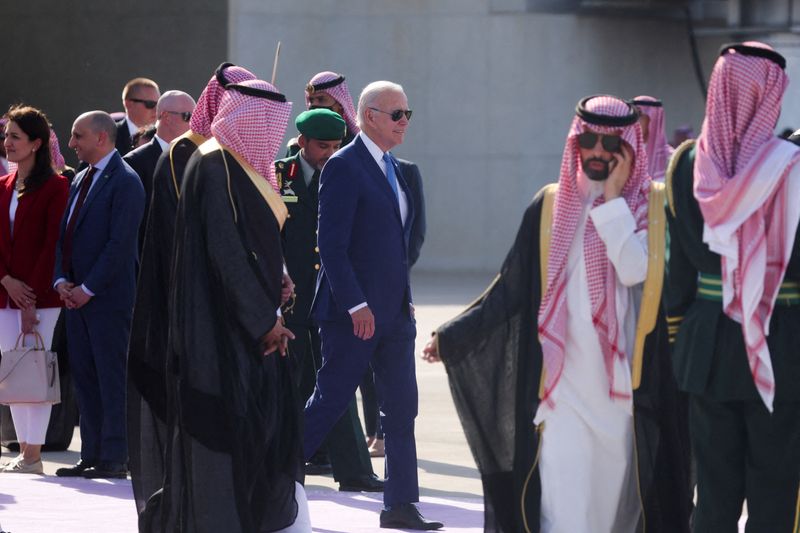U.S. optimistic about next OPEC+ meet – administration official
2022.07.28 17:41

FILE PHOTO: U.S. President Joe Biden walks to board a plane following an Arab summit, at King Abdulaziz International Airprot, in Jeddah, Saudi Arabia, July 16, 2022. REUTERS/Evelyn Hockstein/File Photo
By Maha El Dahan and Ghaida Ghantous
DUBAI (Reuters) – The United States is optimistic that there could be some positive announcement when OPEC+ meets next week, a senior administration official said on Thursday, adding that additional oil supplies would help further stabilise the market.
The official said this was based on conversations during President Joe Biden’s bilateral and multilateral meetings on his recent visit to Saudi Arabia, but that “these are decisions that OPEC members have to make and we respect that process”.
“We are optimistic based on the conversations we had about this next OPEC+ meeting,” the official, who declined to be named told reporters.
“We think that, obviously, additional supply would certainly help even further stabilise the market and potentially bring prices down.”
The Biden administration has come under pressure to cut gas prices and other consumer costs ahead of the Nov. 8 mid-term elections where his Democratic Party is seeking to retain control of Congress.
OPEC+, which includes both Saudi Arabia and Russia, meets next on Aug. 3.
During his visit to Saudi Arabia earlier this month as part of a Middle East trip Biden failed to secure public pledges on raising oil output from Gulf OPEC producers. Saudi Arabia’s foreign minister later said on July 19 that there was no shortage of oil in the market, but a lack of refining capacity.
Oil prices rocketed after the United States and Europe imposed sanctions on Russia over its invasion of Ukraine. Prices have slipped since then.
The Group of Seven richest economies – the United States, Canada, Japan, Germany, France, Italy and Britain – said last month they would consider setting a price cap on Russian crude to curb the oil revenue that Moscow uses to finance the invasion, which it calls a special military operation.
The U.S. administration official said the price cap was an “idea worth exploring” but that a lot of work was still needed to determine its feasibility, including establishing the price level and getting other countries on board.
“It will be difficult to know exactly, because we haven’t gotten there yet, what impact it would have if major oil importers such as China and India refuse to go along with it.”
China and India are already buying Russian oil at a discount to the market price.








